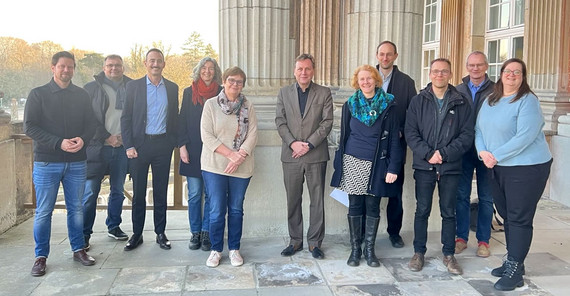Models of Thinking: Cognitive Sciences
The University’s Research Focus Cognitive Sciences investigates the complex cognitive performance of humans and artificial cognitive systems. It brings together researchers from the Faculties of Human Sciences, Sciences, and Arts, and from two external institutions. Topics of collaborative projects include the structure, dynamics, and development of language, visual perception, attention, motor skills, and cognition in children, adults, and elderly people, using experimental or clinical methods and computational cognitive modeling procedures.
“The Research Focus continues the long-standing successful research tradition in cognitive sciences at the University of Potsdam: Psychology, linguistics, mathematics, computer science, and other disciplines work closely together to explore the mechanisms of perception and behavior. Cognitive science research at the University of Potsdam is characterized not only by the successful investigation of the interplay of linguistic and non-linguistic mental processes but also by modeling dynamics and researching age groups from young children to elderly people.”
Prof. Dr. Birgit Elsner, Faculty of Human Sciences
Dynamics of Evolution: Evolutionary Systems Biology
How does evolution create new trait expressions? The researchers use experimental approaches, bioinformatics, and modelling to investigate this question. The growth and development of organisms are based on the interplay of countless components in molecular and cellular networks. In the course of evolution, new traits have evolved by changing the structure of these networks, their components, or the dynamics of their interactions. The researchers from the Institute of Biochemistry and Biology aim to understand how these changes came about and how they translate into new traits, but also whether the structure of the molecular and cellular networks favors certain evolutionary changes.
“We will pay particular attention to the differences in these networks that underlie different environmental responses in order to understand the adaptability of organisms to a changing environment.”
Prof. Dr. Michael Lenhard, Faculty of Science
Education for Resilience in a World of Digital Change:Education for the Future
What role does the digital living environment of children and adolescents play in the development of competences for social participation in a fast-changing world? Researchers from educational science, psychology, elementary school and inclusive education, sociology, and business informatics are investigating this question in an interdisciplinary and application-oriented manner. The aim is to better understand the complex interactions of growing up in a culture of digitalization on the one hand, and the influence of individual characteristics of children and adolescents on the other. In addition, the researchers want to develop practical measures on this basis to strengthen resilience in dealing with an uncertain world. These measures are intended to make better use of the potential of digital offerings, which enable more equitable access to educational opportunities for everybody. They are also intended to mitigate the possible negative effects of growing up in a digital world.
“The effects of digital media on the mental health of and opinion formation among children and adolescents are the subject of many and often very emotional public discussions. With the University’s Research Focus, we want to help ensure that the public debate is based on empirical findings and support children and adolescents in acting responsibly and competently in a digital world.”
Prof. Dr. Katharina Scheiter, Faculty of Human Sciences
Individuals in Ecosystems and Global Change: Individual-Based Global Change Ecology
The increasing loss of biodiversity and the degradation of ecosystems are among the most pressing challenges of our time. A deep understanding of the complex cause-effect relationships of natural processes and human activities is crucial for deriving sustainable strategies for action and policy recommendations. However, our understanding of these processes is still limited, as prevailing concepts in ecology, environmental and climate sciences often fail to consider the underlying complexity of these systems. Therefore, the University Research Focus concentrates on the causal links between biodiversity, global change, and human well-being. The aim is to develop global change ecology into a science that is able to make predictions about the interactions between individuals, communities, and ecosystems, as well as humans.
“Individual differences have hardly played a role in ecology so far. We want to focus on the actors of global change: the individuals.”
Prof. Dr. Jana Anja Eccard, Faculty of Science
Materials of the Future: Sustainable Materials Design
Sustainable materials are a crucial building block for meeting our current demand for goods and preserving resources for future generations at the same time. They contribute to conserving resources, utilizing energy specifically for chemical processes, and enabling closed-loop material cycles. The University Research Focus pursues two goals: In addition to the sustainable production and use of functional materials, it aims to improve the understanding of fundamental processes of light-matter interactions that will enable the sustainable production of materials in the future. To this end, light-matter interactions are investigated using state-of-the-art spectroscopic and microscopic methods. Ultimately, new paths to sustainable materials are to be developed.
“We are looking at the materials of the future, which should be produced in the most resource-efficient way possible and be recyclable, and at materials that help us to use available solar energy. The URF combines research ranging from fundamental physical processes to the synthesis of complex and bioinspired materials.”
Prof. Dr. Ilko Bald, Faculty of Science
More information on Emerging Fields:
https://www.uni-potsdam.de/en/research/profiles-projects-and-programs/research-profile/research-focuses
This text (in german language) was published in the university magazine Portal - Eins 2025 „Kinder“.

